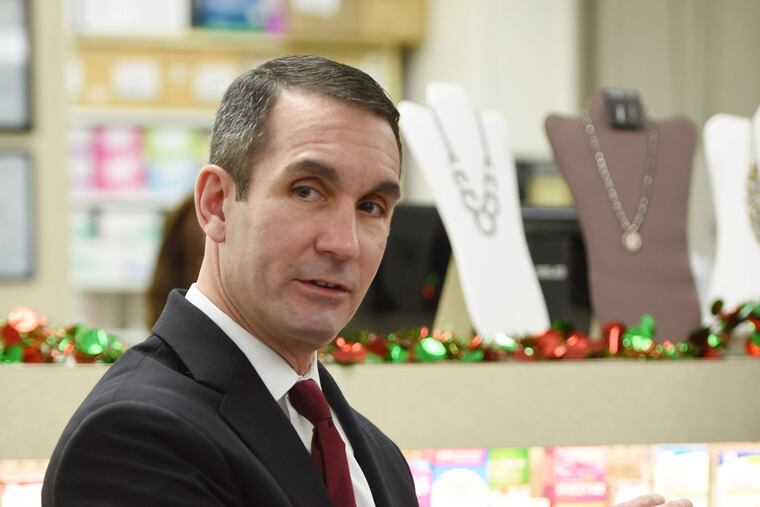Pa. auditor general presses for new laws on pharmacy benefit managers
Auditor general Eugene DePasquale said Thursday said that pharmacy benefit manager business practices are “harming” independent pharmacies, and that he was concerned about the “future of competition” among retail pharmacies in the state.

In an ongoing political battle over high drug prices, Pennsylvania’s auditor general pressed the state Senate to take up a host of reform measures aimed at pharmacy benefit managers that receive billions of dollars in state Medicaid spending.
“Improving transparency and accountability could go a long way toward reducing the cost of prescription drugs,” Auditor General Eugene DePasquale said Thursday during a news conference in Harrisburg.
DePasquale also said that pharmacy benefit manager business practices are “harming” independent pharmacies, and that he was concerned about the “future of competition” among retail pharmacies in the state. His office said that 48 independent pharmacies state-wide closed or were sold in the last 12 months, according to the Pennsylvania Pharmacists Association, a trade group.
The auditor general touted four bills that passed the state House of Representatives in November, and he said the Senate should do the same and “send them to the governor for his signature.” Both houses are controlled by Republicans, while Gov. Tom Wolf is a Democrat.
Pharmacy benefit managers, or PBMs, are middlemen companies hired by insurers and health plans to administer prescription drug benefits. Both PBMs and pharmaceutical companies have taken heat as President Donald Trump, members of Congress, and state officeholders have sought to address rising drug costs.
But PBMs maintain that they help control costs, partly by acting as a check on drugmakers and pharmacies. “The legislation supported by the auditor general will increase prescription drug costs for the state’s health plan sponsors and consumers, and would only increase the profits of independent pharmacies,” said Greg Lopes, a spokesperson for the PBM trade group Pharmaceutical Care Management Association (PCMA).
In Pennsylvania and elsewhere, the state contracts with managed care organizations to provide Medicaid services, and those companies subcontract with PBMs. DePasquale has been vocal about the fact that he cannot audit PBMs because they don’t contract directly with the state.
PBMs collected $2.86 billion for administering Medicaid services in 2017, the auditor general found, more than double the $1.41 billion the companies received in 2013. The amount of money included the PBMs’ “cost of doing business,” but DePasquale’s office said there was “no way to verify how much was profit.”
Last April, two U.S. senators requested a federal inquiry into PBM pricing practices in state Medicaid programs, citing DePasquale’s findings, among others.
Measures passed by the Pennsylvania House in November would regulate how PBMs do business and force them to open their books to the state. One of the bills would give DePasquale’s office the authority to audit PBM contracts tied to the state’s Medicaid program.
Another piece of legislation would prohibit PBMs from putting “gag clauses” on pharmacists, which prevent them from talking to patients about drug prices.
“The gag clause is hard to even explain to people,” said pharmacist Chuck Kray, who owns Hershey Pharmacy and is president-elect of the Pennsylvania Pharmacists Association. He said he recently filled a prescription for an inhaler, and the brand version cost about $350, while the generic cost was about $40.
The customer’s “insurance was mandating the brand at a $100 copay,” Kray said. “And by law, I couldn’t tell him” that he could sell the customer the cheaper generic version.
Lopes, the PCMA spokesperson, said: “PBMs support patients always paying the lowest price available at the pharmacy counter for their prescribed drug.”
HB 941, meanwhile, would put new parameters on how PBMs reimburse pharmacists for the medications they sell to insured patients.
“For many medications, payments are well below cost, forcing pharmacies to operate in the red,” according to the bill’s sponsorship memo by State Reps. Doyle Heffley (R., Carbon) and Robert F. Matzie (D., Beaver). “These pharmacy reimbursement cuts make it extremely difficult for the 900 independent pharmacies in our commonwealth to maintain inventory, stay in business, and serve our most vulnerable citizens.”